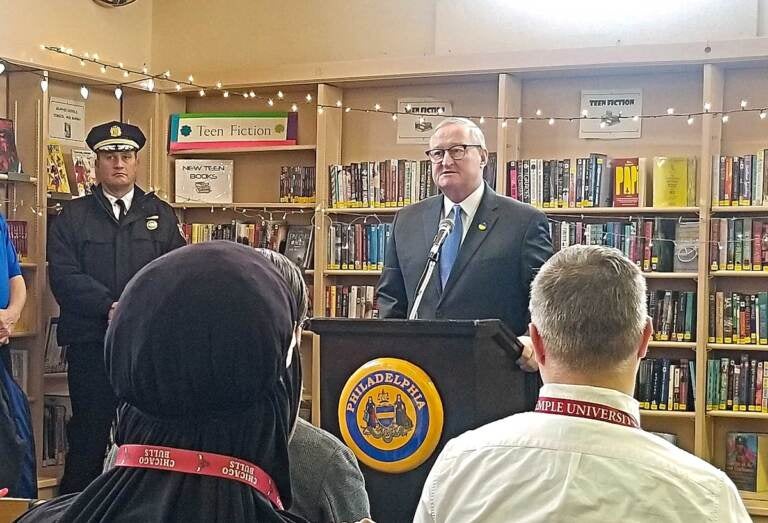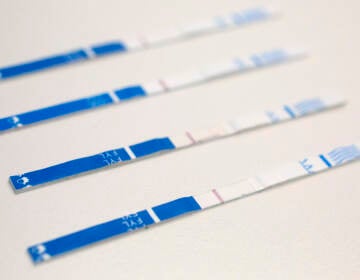1st year of Philly’s opioid settlement funds to be spent on overdose prevention, wrap-around services in hard-hit areas
Philadelphia stands to receive about $200 million total in opioid settlement funds over 18 years from a major national lawsuit against three drug distributors.

Philadelphia Mayor Jim Kenney joins city and community officials in Kensington to unveil the city's plans for spending $20 million in opioid settlement funds on Thursday, Jan. 5, 2023. (Nicole Leonard/WHYY)
Millions of dollars in opioid settlement funding have reached Philadelphia, and city officials unveiled a plan to spend the money in several key areas to combat the ongoing addiction and overdose crisis.
During Thursday’s announcement at McPherson Square Library in Kensington, officials said their main goal will be to work closely with community organizations, grassroots initiatives, and local leaders to make sure $20 million is used and distributed effectively.
“The overdose crisis has wrought incalculable harm on communities across the United States,” Mayor Jim Kenney said. “The grief and community trauma have compounded for years in Philadelphia as well, especially here in Kensington and the surrounding neighborhoods.”
The money is the first installment of payouts from a historic national settlement with pharmaceutical drug distributors AmerisourceBergen, Cardinal Health, and McKesson, and manufacturer Johnson & Johnson.
In total, the city stands to receive about $200 million over 18 years.
Pennsylvania will also collect money from other national opioid settlements with Purdue Pharma, the makers of Oxycontin, and pharmacy chains CVS and Walgreens, in lawsuits over their roles in the opioid and addiction epidemic.
About 1,276 people in Philadelphia died from a drug overdose in 2021, the highest number ever reported for the area, according to city data.
“Philadelphia continues to see a massive toll of overdose deaths affecting every city, neighborhood and every demographic,” Health Commissioner Dr. Cheryl Bettigole said.
She added that overdose rates among Black and Latino residents in particular have sharply risen in the last year.
Investing in Kensington
The neighborhood of Kensington has been one of the hardest-hit communities in Philadelphia — and the greater Delaware Valley region — of the opioid epidemic.
People suffering from substance use have flocked to the area for years. Homelessness and crime have become consistent problems, and the pervasiveness of addiction in the neighborhood has affected long-time residents and businesses.
A big chunk of the city’s settlement money — $7.5 million — will go toward community health and wellness programs in Kensington. Local leaders said the funding will not only help people struggling with substance use, but also help revitalize the neighborhood as a whole.
Dollars will be used to help Kensington residents with home repairs, rent relief, and foreclosure support. There will also be grants for groups that work to maintain public parks as safe, drug-free zones for youth. Some of the money will be used to support schools and their playgrounds, security, and staff.
Dr. Bill McKinney is the executive director of the New Kensington Community Development Center.
“Hopefully, these specific investments will help those suffering from addiction, from being unsheltered,” McKinney said, “will help families and children who have suffered for the crime of living here, will help our schools and parks so that we have the same things that everyone else in this room wants for themselves and their families.”
Substance use treatment
Another $4 million of the settlement money will go toward opioid and substance use treatment programs throughout the city, including expanding existing services.
The city will look to establish mobile methadone vans that can make medication assisted treatment more accessible.
Methadone is one of the most tightly regulated treatment medications, despite its proven success in helping people get into recovery for an opioid addiction. To get the medication, people typically have to show up, in person, every day, to get a single dosage.
“[A van] brings treatment to where people are,” said Dr. Jill Bowen, commissioner of the city’s Department of Behavioral Health and disAbilities Services. “It reduces barriers to treatment access, and ultimately connects people to bricks and mortar treatment and brings them off the street.”
The federal Drug Enforcement Administration lifted a 14-year moratorium on the establishment of new methadone vans in June 2021.
Bowen said mobile programs will offer people same-day medication enrollment and dosing.
Settlement funding will also be used to increase the dosage of buprenorphine medication for those in prisons from 8 milligrams to 16 milligrams in order to be on par with dosing regulations in outpatient treatment programs.
Officials will use the money to expand the availability of methadone to people in prison.
Other dollars will go toward the Kensington Hospital’s wound care program, which involves two mobile vans that bring medical and health care services to people with injuries and infections that they’ve gotten while using substances.
Housing-first initiatives
Funding will be directed to wrap-around services like housing. About $3.7 million will provide housing support for people who are experiencing both homelessness and addiction citywide.
The plan will create 200 housing opportunities for people in substance use treatment who are returning to the community from prison, for people who may need housing to access a treatment program, and for those returning from inpatient treatment who are looking to maintain their recovery in an outpatient setting.
Liz Hersh is director of the city’s Office of Homeless Services.
“What we hear from people on the street is, ‘What if I come in and got treatment, but then what? I’m still going to be homeless. Where am I going to go after I come out of it?’” she said. “These 200 additional housing opportunities is to support 200 more people wherever they are in their recovery and their recovery journey so that they don’t return to homelessness and return to their addiction long term.”
Long-term support
The city committed a yearly allocation of $3.5 million to the Overdose Prevention and Community Healing Fund, which will award community-based organizations with funding to do work in areas of Philadelphia that are most affected by the opioid epidemic.
This work includes prevention efforts, and addressing community trauma and stigma. A portion of the money will specifically be earmarked for efforts in Kensington.
Overdose response, alternatives to incarceration, and city outreach and engagement
The rest of the settlement money will go toward expanding overdose prevention education and tools, including having behavioral health experts partner with paramedics on overdose emergency calls.
The city plans to strengthen a collaboration between the Philadelphia Police Department and a network of community providers to offer people with non-violent offenses an alternative to incarceration in the form of substance use treatment.
Officials said they also want to grow public outreach efforts and focus on three areas: overdose risks among juvenile justice-involved youth; the intersection of Black maternal and pregnancy health and substance use; and engaging faith-based communities as trusted sources of information for community members.
City leaders said ultimately, all these solutions need to be community driven.
“Our local residents and neighborhood-level organizations are best positioned to tell us how to use this money and how to spend this money,” said Tumar Alexander, managing director for the City of Philadelphia. “They change their neighborhoods. They understand their communities.”
Officials said they plan to disburse and distribute this first year of opioid settlement funding by the end of Kenney’s last year in office as mayor.
If you or someone you know is struggling with substance use, SAMHSA’s National Helpline is a free, confidential, 24-hour hotline that offers referrals to local treatment facilities, support groups, and community-based organizations. Call 1-800-662-HELP for more information.
WHYY is your source for fact-based, in-depth journalism and information. As a nonprofit organization, we rely on financial support from readers like you. Please give today.






